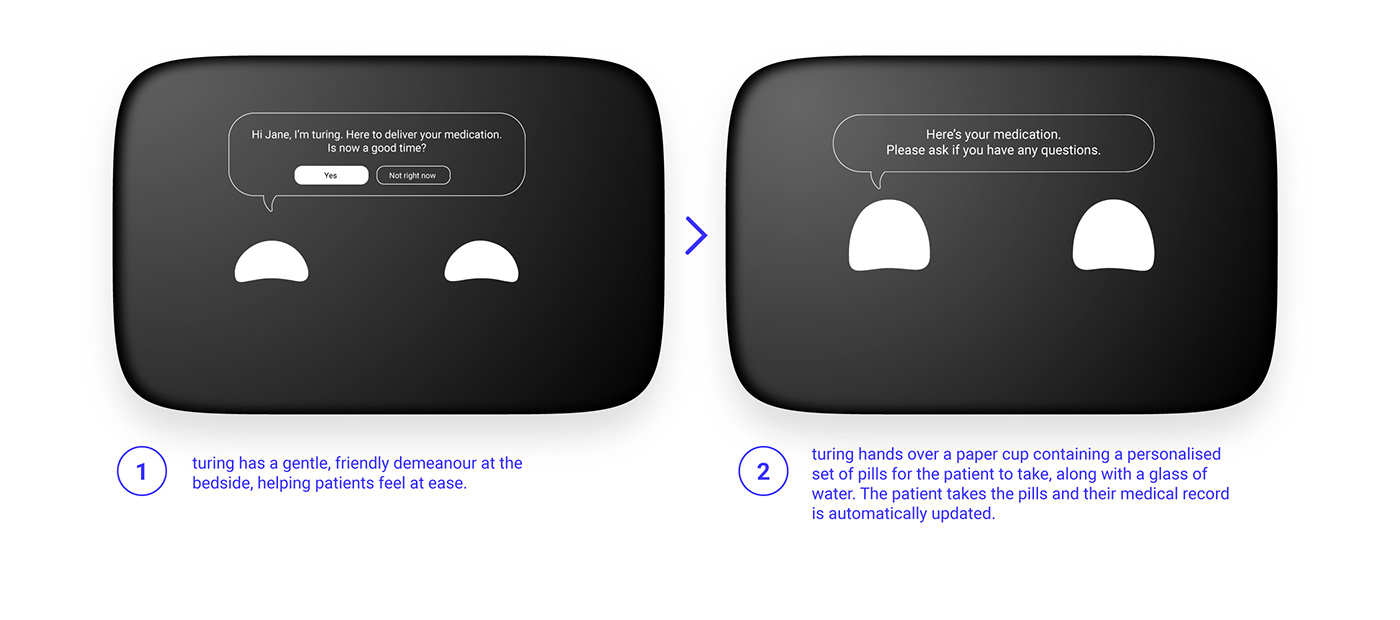
Robots are on the rise; however their impact remains limited while they struggle to navigate and work in complex human environments. For this reason, their adoption has been restricted to industries such as logistics and manufacturing where human access can be carefully controlled.
Turing is a robotic platform with emotional design at its core. It supports crowd navigation and human collaboration and carries a suite of tools to address a wide range of use cases. This approach unlocks the vast untapped value of human-machine collaboration and tackles one of the few remaining barriers to a future populated by robot helpers.
This is a speculative design concept, developed by a multi-disciplinary team of designers, engineers and researchers.





During early UX testing, we found mimicking human emotion was an effective means of communicating the robot's movements. We used journey mapping to imagine a coherent set of thoughts and emotions for the robot; this resulted in a personality and behaviour that users could empathise and interact with.

By analysing well known characters from across animation and film, we were able to map their behavioural traits and identify the most appropriate personality for a given environment.
Humans modify their behaviour based on context, what’s normal for a medical environment might seem strange in a restaurant. Turing’s parametric character can be modified to suit different environment.


Introducing Turing, the social, modular robot. Working closely with roboticists and behavioural researchers we developed an emotional robotics platform for use in complex human environments.
Turing is designed to work with and around people. It can navigate through crowded environments while leveraging body language, gestures and other emotional cues to talk to our sub-conscious. This intuitive form of communication is much faster than speech enabling the sub-second reaction times needed to avoid collisions in crowds. The modular nature of the system allows it to operate in a range of industries and adapt to a variety of business needs.


In retail, Turing can support shoppers with a variety of tasks, from general information and store navigation to carrying shopping bags.



In the service industry where business are struggling to recruit enough staff, Turing can help take orders or deliver food & drink to customers in bars and restaurants. Turing displays personality and charm, giving customers a great experience that can be customised for each venue.

In medical environments, Turing can help reduce the burden on medical professionals by performing repetitive, time consuming tasks, freeing staff to spend more time with patients. Tasks such as pill dispensing on low-risk hospital wards are ideal for Turing as they are highly repetitive, tedious and require long periods of concentration - something people struggle with.













This content was originally posted on Cambridge Consultants' website. Cambridge Consultants develops breakthrough products, creates and licenses intellectual property and provides business consultancy in technology critical issues for clients worldwide. For more than 50 years, the company has been helping its clients turn business opportunities into commercial successes, whether they are launching first-to-market products, entering new markets or expanding existing markets through the introduction of new technologies.






